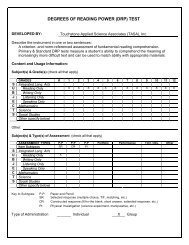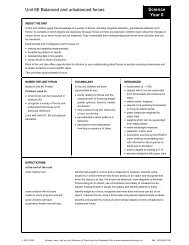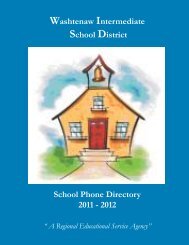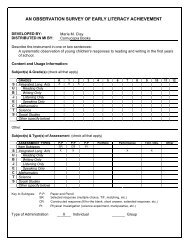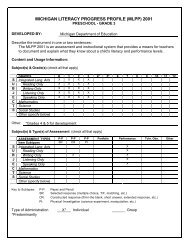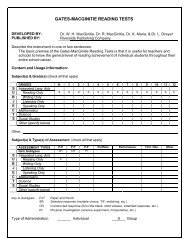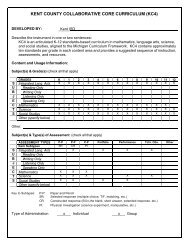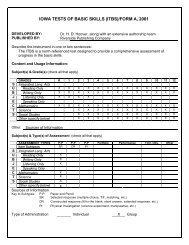PROCEDURAL SAFEGUARDS AVAILABLE TOPARENTS OF STUDENTS WITH DISABILITIESJuly 2005Appendix GIntroductionThis document provides parents of students with disabilities, from birth through age 26, an overview of their educational rights withrespect to special education. This document incorporates all procedural safeguards to parents and students with disabilities afforded underthe Individuals with Disabilities Education Act (IDEA) and the IDEA implementing regulations.Procedural Safeguards NoticeA Procedural Safeguards’ Notice shall be provided to parents at least one time per year, except a copy also shall be given to the parents on:1. An initial referral or parental request for evaluation;2. The first occurrence of the filing of a due process hearing;3. <strong>Parent</strong>al request; or4. The day on which the decision to take disciplinary action involving a change in placement is made.<strong>Parent</strong> Consent“Consent” means that: (a) the parent has been fully informed of all information relevant to the activity for which consent is sought, in his or her nativelanguage or other mode of communication; (b) the parent understands and agrees, in writing, to the carrying out of the activity for which his or her consentis sought, and the consent describes that activity and lists the records (if any) which will be released and to whom; and (c) the parent understands that thegranting of consent is voluntary on the part of the parent and may be revoked at any time. However, if a parent revokes consent, that revocation is notretroactive.<strong>Parent</strong> consent is not required before reviewing existing data as part of an evaluation or reevaluation or when administering a test or other evaluation that isadministered to all students unless, before administration of that test or evaluation, consent is required of parents of all students. <strong>Parent</strong> consent if notrequired for the screening of a student by a teacher or specialist to determine appropriate instructional strategies for curriculum implementation and shallnot be considered to be an evaluation for eligibility for special education and related services.The public agency must obtain informed parental consent before conducting an initial evaluation, any reevaluation, or initially placing a student withdisabilities in a program providing special education and related services. Consent for an initial evaluation may not be construed as consent for initialplacement. If a parent does not provide consent for an initial evaluation, or the parent fails to respond to a request to provide the consent, the localeducational agency may pursue the initial evaluation of the student through a due process hearing. If a parent fails to respond to a request for areevaluation, the public agency may conduct a reevaluation if it can demonstrate that reasonable measures to obtain parental consent have been taken.To conduct an initial evaluation, the district must seek parental consent and provide notice, which includes the following:1. The reason(s) and nature for an evaluation; and2. A description of the types of special education programs and services available within the intermediate school district (ISD).A local school district shall not provide initial special education programs and services to a student if the parent refuses to consent to those programs orservices.LimitationA public agency may not use a parent’s refusal to consent to one service or activity to deny the parent or student any other service, benefit, or activity of thepublic agency, except as required by the IDEA.Prior Notice to <strong>Parent</strong>sThe public agency must provide prior written notice to the parents of a child with disabilities each time it proposes or refuses to initiate or change theidentification, evaluation, or educational placement of the student or the provision of a free appropriate public education (FAPE) to the student.The notice must include:1. A description of where a parent can obtain a copy of the Procedural Safeguards document;2. A description of the action proposed or refused by the public agency, an explanation of why the public agency proposes or refuses to take action,and a description of any options the public agency considered and the reasons why those options were rejected;3. A description of each evaluation procedure, assessment, record, or report the public agency uses as a basis for the proposal or refusal;4. A description of any other factors which are relevant to the public agency’s proposal or refusal; and5. A list of sources that parents may contact to obtain assistance in understanding the content of the prior notice.The notice must be written in language understandable to the general public, and be provided in the native language of the parent or other mode ofcommunication used by the parent, unless it is clearly not feasible to do so. If the native language or other mode of communication of the parent is not awritten language, the public agency shall have the notice translated orally or by other means to the parent in his or her native language or other mode ofcommunication so that the parent understands the content of the notice. The public agency must maintain written evidence that these requirements havebeen met.<strong>Parent</strong> InvolvementEach public agency shall provide notice to ensure that parents of children with disabilities have the opportunity to participate in meetings with respect to theidentification, evaluation, and educational placement of the child, and the provision of a free appropriate public education (FAPE).32
MeetingA public agency shall take steps to ensure that one or both of the parents of a child with a disability are present at each individualized education program(IEP) meeting, or are given the opportunity to participate. A meeting does not include informal or unscheduled conversations involving public agencypersonnel and conversations on issues such as teaching methodology, lesson plans, or coordination of service provision if those issues are not addressed inthe student’s IEP. A meeting also does not include preparatory activities that public agency personnel engage in to develop a proposal or response to aparent proposal that will be discussed at a later meeting.Each public agency shall ensure that the parents of each student with a disability are included as members of any group that makes decisions on theeducational placement of their child. If neither parent can participate in a meeting in which a decision is to be made relating to the educational placement oftheir child, the public agency shall use other methods to ensure their participation. An initial placement may not be made without the consent of a parent.However, other placement decisions may be made by a group without the involvement of the parent(s) if the public agency is unable to obtain the parent’sparticipation in the decision. The public agency must have a record of its attempt to ensure the parent(s) involvement.The public agency shall make reasonable efforts to ensure that the parent understands and is able to participate in any group discussion relating to theeducational placement of his or her child, including arranging for an interpreter for the parent with deafness or whose native language is other than English.Evaluation Procedures“Evaluation” means procedures used in accordance with 34 C.F.R. §§300.530 to 300.536. An evaluation will determine whether a student is a student with adisability, the nature and extent of the special education and related services that the student needs, and provide information relating to the student’sinvolvement and progress in the general curriculum. Preschool children must also be assessed to determine participation in appropriate activities. The termalso means procedures used selectively with an individual student and does not include basic tests administered to or procedures used with all students in aschool, grade, or class.The parent has the right to:1. Have an interpreter/translator present if the primary language is not English, or if the student is deaf/hearing impaired or visually impaired, unless it isclearly not feasible to do so;2. Be assured that testing does not discriminate on the basis of race, language, or cultural background;3. Be assured that the assessments and other evaluation materials used to assess a student are provided and administered in the language and formmost likely to yield accurate information on what the student knows and can do academically, developmentally, and functionally, unless it is notfeasible to provide or administer;4. Have evaluation instruments validated for the specific purpose(s) for which they were intended and administered by trained personnel in conformancewith the instructions provided by their producer;5. Have the student assessed in all areas of suspected disability using instruments that assess specific areas of educational need and do not producemerely a single intelligent quotient score. No single measure or assessment is to be used as the sole criterion for determining an appropriate specialeducation program for the student;6. Be assured that if a test is administered to a student with impaired sensory, physical, or speaking skills, the test results accurately reflect what the testintends to measure rather than the student’s disability;7. Have the initial evaluation made by a multidisciplinary evaluation team (MET) which includes a teacher or person knowledgeable in the area of thesuspected disability;8. Be assured that the student is assessed in all areas related to the suspected disability including, if appropriate, health, vision, hearing, social andemotional status, behavioral factors, general intelligence, academic performance, communicative status, and motor ability;9. Have an evaluation that is sufficiently comprehensive to identify all of the student’s special education and related services’ needs, whether or notcommonly linked to the disability category in which the student has been classified;10. Provide the MET with information about the student’s suspected disability, along with any evaluation the parent may have obtained for the student;11. Be assured that a variety of assessment tools and strategies are used to gather relevant functional, developmental and academic information aboutthe student, including information provided by the parent and information related to enabling the student to be involved in and progress in the generalcurriculum;12. Have an initial evaluation conducted by a MET and convene an IEP meeting within 30 school days after the school has received the written permissionto evaluate. This timeline may be extended by agreement between the parents and the agency;13. Expect a reevaluation every three years, unless the parent and the local school district agree that a reevaluation is unnecessary;14. Request a reevaluation not more frequently than once a year, unless the parent and local educational agency agree otherwise;15. Be notified of each evaluation procedure, test, record, or report the IEP Team used in determining eligibility, and the need for special educationprograms or services; and16. Be assured that a local district will coordinate prior assessments of students with disabilities who transfer from one school district to another in thesame academic year as necessary and expeditiously as possible to ensure prompt completion of full evaluations.Independent Educational EvaluationAn “Independent Educational Evaluation” (IEE) means an evaluation conducted by a qualified examiner who is not employed by the public agencyresponsible for the education of the student in question. An “IEE at public expense” means that the public agency either pays for the full cost of theevaluation or ensures that the evaluation is otherwise provided at no cost to the parent.The parent of a student with a disability or suspected disability has the right to obtain an IEE of the child. A parent has the right to an IEE at public expenseif the parent disagrees with any evaluation obtained by the public agency. However, the public agency may initiate a due process hearing to show that itsevaluation is appropriate. The public agency shall respond, in writing, to the parent’s request for an IEE within seven calendar days of the parent’s writtenrequest. If the final decision is that the evaluation is appropriate, the parent still has the right to an IEE, but not at public expense. If the parent obtains anIEE at his/her own expense, the results of the evaluation must be considered by the public agency in any decision made with respect to the provision of aFAPE to the student, and may be presented as evidence at a due process hearing regarding the student.33




